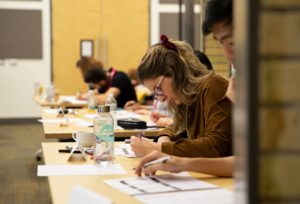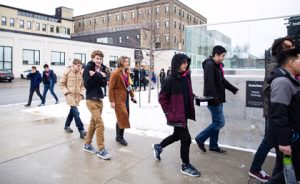University of Waterloo students scooped up the $12,000 in top prizes Saturday at the fourth annual Code/Design to Win finals, held at Communitech in Kitchener.
Ahmed Sabie, a third-year computer science student at UW, placed first in the coding portion, taking home a cheque for $5,000 while Farbod Yadegarian, also a third-year CS student at UW, placed second, earning a cool $1,000. Both tied with a perfect score of 600, with the winner decided by the finishing time.
Of the coding winners, Tina Wilton, Communitech’s Campus Engagement Specialist, said, “The average time for solving the six hard problems is 4.5 hours. These two students solved them in under two hours.
“These students are remarkable.”
In the design portion, Peter Liu, a UW graduate with a double major in urban planning and economics, impressed the judges enough to earn the $5,000 first prize, while Victoria Vandenberg, a fourth-year UW student in global business digital arts, took home the cheque for $1,000.
Wilton said the design competitors had a range of skills, and that “the companies coming here are looking for a huge skill set, and that was demonstrated in the very impressive design submissions. It was a very close competition.”
Coding winner Ahmed Sabie said he wanted to thank Communitech “for offering the opportunity to meet all these other cool people. There are not a lot of events like this — this is really unique.” Better than the prize money, perhaps, was the post-presentation chat with a rep from TD’s Innovation Lab. Said Sabie, “I’m interested, but I’m keeping my options open.”

More than 1,000 post-secondary students from
across Canada vied for 75 spots in this year’s
Code/Design to Win event.
(Communitech photo: Anthony Ramsay)
After a brief post-presentation chat with a Google rep, Design winner Peter Liu said he was grateful for the win, because as a new graduate, “I’m unemployed right now.”
He said that taking part in the competition is “super intimidating. I feel like I’m surrounded by all these people who are smarter than me, but when you’re at Communitech, that often happens.”
This was the biggest year yet for Code/Design to Win with 746 coders and 258 designers participating in preliminary challenges on campuses across Canada. From those 1,004 entrants, a mere 50 coders — three of them women — and 25 designers — 20 of them women — ranging in age from 17 to 25, were selected from such schools as UBC, Simon Fraser, Concordia, McGill, Waterloo and Conestoga College for the finals.
It was a two-day immersion in the Waterloo Region’s rich tech environment, with tours and workshops with event sponsors Google Canada, Oracle NetSuite and Deloitte Canada, and an evening of pitches by would-be employers at the headquarters of another event sponsor, North Inc. Some sponsors — Google, hearing care company Sonova Canada and TD Bank Group — interviewed select students, while all students had a chance to connect with all the sponsors, which also included micro-learning company Axonify, blockchain software firm Consensys, financial giant Manulife and IOT-developer ZTR.
And, because networking shouldn’t be taken too seriously, there was a soft skills event — an egg-drop challenge in the Communitech foyer — to test the participants’ ability to form teams, work with strangers and solve problems on the fly. There were a few scrambled eggs among the many innovative approaches to cargo protection.
The event began Friday, with the tours and the pitches. At Friday’s pitch night, the 75 students were told that one company hires up to 30 co-op students each term, while another promised that student hires would help it empower business to deliver services and products “that people love.” The employers told the crowd they wanted students interested in AI, cloud-based solutions and machine learning, and that they depend on the students’ “brains and hard work” to help their companies succeed.
Wilton says the Friday pitches and networking opportunities on Saturday are essential to Code/Design to Win. “We want to connect our sponsors with the top tech talent from across Canada, and we want to showcase the Waterloo Region as a place to work and to live.”

Competitors in Code/Design to Win file in for a
tour of Deloitte’s regional office across the street
from the Communitech Hub.
(Communitech photo: Alex Kinsella)
For the sponsors, it was the opportunity to woo some of the best tech students in Canada.
Akailah Wilson, university programs specialist with Google, said “This is a great opportunity to see the top 50 coders and top 25 designers in the country, and it’s a way to support Communitech and the growth of the tech community here in the region.”
Simon Graham, web development team lead for ZTR of London, said his company was looking for people “who will challenge each other and support each other. We need to know that we are talented as individuals, but together, we’re so much more.”
Carmen Zannier, director of software development at Oracle NetSuite, said, “It’s so good to see so many energetic students. That’s what’s so wonderful about a day like today.”
What prompted the students to enter the competition?
Finn Macdonald, a software engineering student at University of Waterloo, said, “I really enjoy programming, so any form of competition is a great opportunity.”
Alexa Liaskovski, a computer science student at Carleton University, hosted the preliminary on campus in Ottawa, and won a spot in the finals. Her trip to the finals was a revelation: “Coming here, I didn’t know that Waterloo was such a big tech community.” Liaskovski said she was intrigued by the work that Sonova is doing: “You wouldn’t think that that hearing aids are cool, but the stuff they’re working on is very cool.” And the TD Innovation Lab was impressive: “We don’t have anything like that in Ottawa.”
The tight timelines in the challenges set by the Code/Design to Win team attracted Megan Hasegawa to her second year of participating, and first year in the design finals.
The fourth-year software engineering student at Western University, who has been a campus ambassador for Communitech, says the time limits on the challenge have “helped me hone in on my design process and develop strategies to think quickly on my feet.”
Hasegawa says the event allows her to meet “like-minded students.”
“Since designers come from such diverse backgrounds, it's unique to have an event where you can connect with students pursuing design and learn their paths to the field.”
And what’s the message of Code/Design to Win to those employers who weren’t there?
Says Hasegawa: “To potential employers who aren’t here this weekend, I would say that this is definitely something to add to their campus engagement event list for next year. Code/Design to Win is a unique opportunity for employers to connect with a select cohort of talented students, introduce them to available career opportunities and recruit for internship and full-time positions.”
Manulife’s director of engineering transformation, Naveed Zahid, said, “If you want to find talent, this is the place to be.”

